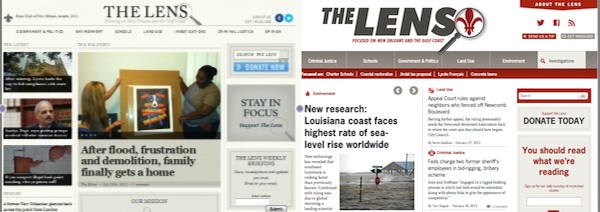
The Lens, the nonprofit news site in New Orleans, announced a major redesign recently. Editor Steve Beatty wrote that the new site would feature responsive design for easier mobile reading, a more intuitive navigation, enhanced readability with highlighting of “important facts and figures,” and more, including a feed from ProPublica’s Muckreads.
But perhaps the most interesting aspect of the new site is that these nice new features didn’t cost The Lens a dime:
The new site is the product of cooperation among nonprofits. It is based on Project Largo, a WordPress theme developed by the Investigative News Network. And that’s an extension of National Public Radio’s Project Argo. The Lens will work with the network to help improve the Largo theme and lower the costs of high-quality publishing for other sites.
Project Argo was a project at NPR, funded by the Knight Foundation and the Corporation for Public Broadcasting, to build topic-based verticals at member stations around the country. Those 12 beat blogs — on immigration in California, higher education in Minnesota, oceans and climate in Boston — were built on a set of WordPress-based tools built under the Argo banner.
Argo’s funding ended after two years (most of the blogs live on), but what lived on technologically speaking were those tools — themes, plugins, and lessons. The code lives on GitHub, but as many open source projects have discovered, the fact that code exists in the open is no guarantee that it will ever be used.
Enter Largo, which (loosely) stands for “longform Argo.” Largo was begun by INN in hopes of repurposing what Argo built for iterative blogging for a more traditional news site. Adam Schweigert, INN’s director of technology, was the lead developer on the Largo Project — or as he put it, the man in charge of asking the question, “What should nonprofit investigative news organizations look like on the web?” Most of INN’s members are small shops without much in the way of either tech capacity or excess budget.
INN had a lot of respect for what Argo had built, Schweigert said, but “there were a bunch of things investigative journalists wanted, especially smaller centers that do more data-focused stuff.” Improvements to that end included more support for embedded content, special pages for feature projects, and improving long-form readability.
One of the biggest additions Schweigert made to the Argo architecture was responsive design, a feature he says is important to the investigative organizations as they try to get a foot holding in mobile. (The Lens’ Beatty says the Largo collaboration has convinced him that separate apps for news outlets will “be looked back on fondly and quaintly one day.”)
The Lens is one of 11 INN members (and the largest) to adopt a design based on Largo. Steve Myers, The Lens’ managing editor (and familiar from his days at Poynter, said those added features were important factors in their decision to join the the project. “I’m a little surprised that we were able to get so much for no cost,” he said, adding that technology consulting is an “important member service” that the INN offers to nonprofit organizations like The Lens. He said pullquotes and other highlighting features are especially useful for the kind of work The Lens does: “Our stories are numbers-based, so we can pull some facts out and make it more of a pleasant experience.” He’s also looking forward to building on DocumentCloud to more easily offer primary sources to the reader.
Schweigert says Largo is still in beta; version 1.0 is currently scheduled to solidify around April. He expects to have between 10 and 12 INN members on Largo by then, increasing to between 15 and 20 by the end of the year. Future goals include better data plugins and an expanded framework for documentation and education. “NPR found [with Argo] that they have to provide a technical tool set and training in tandem,” Schweigert says. “We can give you a publishing tool, but it’s also a process of training folks that come out of print investigative news backgrounds, to sort of train them in skills for the web.”
Myers says his primary concern with switching to Largo was that the Lens site would look too much like a WordPress template rather than something original, a problem he says its extensive customization options helped them avoid. Schweigert’s next goal is to expand the theme’s customization options so that smaller organizations with lower output (say, those that produce just one major story a month) can have a more fitting design.
The original Argonauts (yeah) seem to appreciate the fact that Largo has given Argo an added life:
If you’re interested in learning more about @largoproject, that’s a thing I can hook you up with. largoproject.org#wordpress #rwd
— Adam Schweigert (@aschweig) February 15, 2013
@aschweig Hmmm. Sounds like ‘Argo’ with an ‘L’. @lavallee @lindamood @mthomps
— Joel Sucherman (@JSucherman) February 15, 2013
@jsucherman @lavallee @lindamood @mthomps Surprising, that. It’s almost like all that great work you guys did lives on…
— Adam Schweigert (@aschweig) February 15, 2013
@aschweig @largoproject So excited about this. I’m spreading the word far and wide.
— Wesley Lindamood (@lindamood) February 15, 2013
Myers noted that there’s no guarantee that open-sourced code ever finds a use past its initial release. Largo is trying to break that pattern. “No nonprofit is guaranteed tomorrow,” said Myers, “It’s nice that we don’t have to go out there and keep reinventing the wheel.” Or, in other words:
@jsucherman @aschweig @lavallee @lindamood @mthomps nonprofit iteration FTW
— Steve Myers (@myersnews) February 15, 2013
Of course, INN is itself sustained on grants, which can come and go, but Schweigert says Largo members don’t need to worry about investing in the platform: Unlike Argo, it doesn’t have an expiration date. “It’s designed as a core service,” he said, “We see this as more of an ongoing thing that we will keep investing in.”